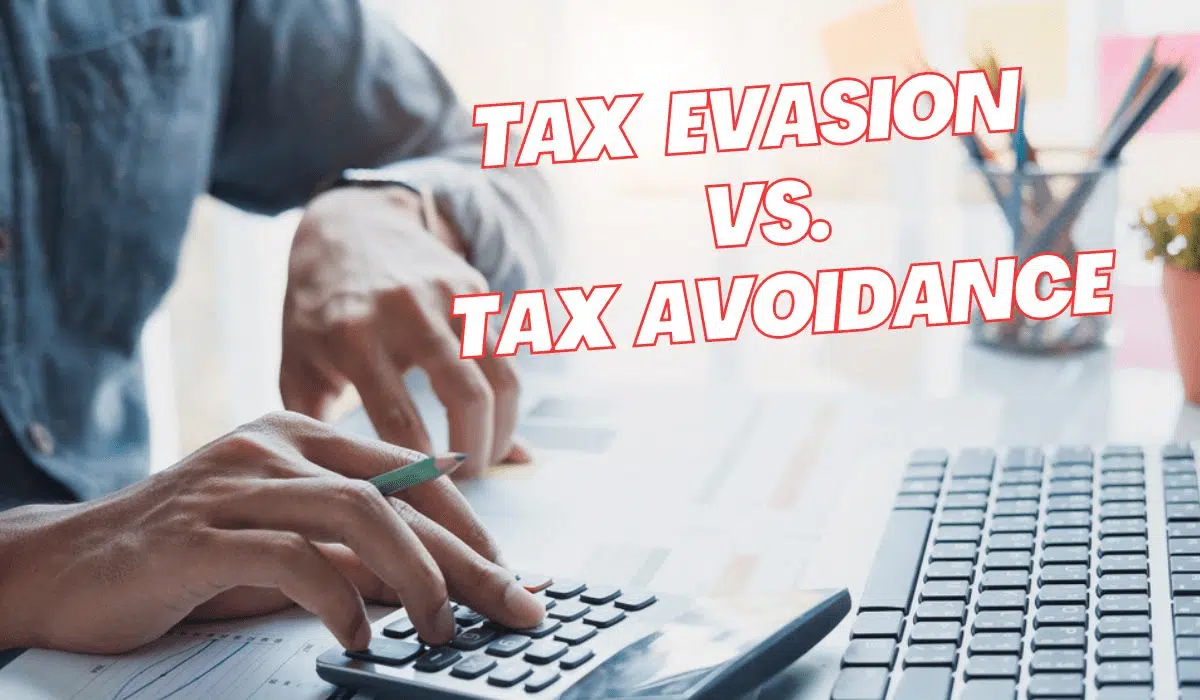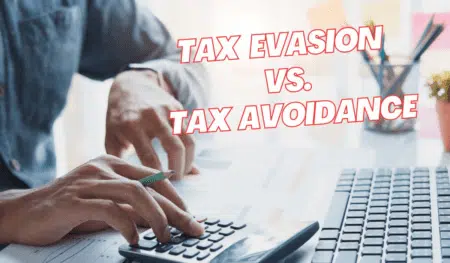Understanding the Difference: Tax Evasion vs Tax Avoidance
Taxes are essential to society and are used to fund various government services, such as healthcare, education, and infrastructure. While most people try to pay their fair share, some individuals and companies engage in practices that allow them to avoid or evade taxes. Although “tax evasion” and “tax avoidance” are often used interchangeably, they have very different meanings when it comes to taxation.
Understanding the difference between these two terms is crucial because it can significantly impact your finances and legal obligations. In this article, learn the difference between Tax Evasion vs Tax Avoidance. We will explore the difference between tax evasion and tax avoidance and their impact on your finances.
Tax Evasion: What Is It?
Tax evasion is the illegal practice of deliberately underreporting or not reporting income, overstating deductions, or hiding assets to reduce the amount of taxes owed to the government. They’re called tax evaders when someone or something goes to illegal lengths to evade paying their taxes.
Tax evasion (illegal non-payment) and falsifying tax originally owed (illegal underpayment) are federal crimes under the Internal Revenue Service IRS tax code. The intent is a big deal here – you’re generally guilty if you intended it. Check out our short video story on tax evasion.
Examples of Tax Evasion
There are several common examples of tax evasion, including:
Reporting personal expenditures as business expenses. Tax deductions are available for certain business expenses but not for personal expenses.
Ignoring overseas income. Often, this affects people who have overseas rental properties.
Under-the-table childcare payments. Cash payments to your employees don’t constitute tax evasion, Freyman says. The IRS doesn’t get to hear about payroll tax payments, though. Ensure the worker gets a W-2 annually and reports the wages on Schedule H. Is that person an employee or not? You can find out what to do in IRS Publication 926. Earned income, including the Earned Income Tax Credit (EITC), is another important factor to consider when filing taxes.
Underreporting cash transactions. In cash-based businesses, you must report all transactions to the appropriate tax authorities.
Overstating your deductions. You must keep proof of all deductions, such as receipts. Estimating them is not a good idea.
Offshoring. Corporations can avoid paying higher taxes at home by setting up offshore subsidiaries or bank accounts in countries with more favorable tax laws.
Tax Avoidance: What Is It?
Tax avoidance is a legal strategy many taxpayers use to avoid paying taxes or reducing their tax bill. The method is a legitimate method that taxpayers can use to reduce their IRS tax bills. A common way to avoid taxes is by taking as many deductions and credits as possible when you complete your tax preparation, which is the use of legal methods. When used in this context, tax avoidance is also referred to as a tax shelter.
Investing in tax-advantaged accounts, such as 401(k)s and IRAs, not only reduces your tax liability as a result of claiming tax deductions and tax credits but also lets you claim a better return on your investment. It is also possible to avoid taxes by investing in investments that offer tax advantages, such as tax-free municipal bonds. Unlike tax evasion, which involves underreporting income and falsifying deductions, tax avoidance, including the exemption from the capital gains tax, does not involve illegal methods.
Examples of Tax Avoidance Strategies
A few examples of tax avoidance strategies are as follows:
Achieving maximum retirement contributions. The tax benefits of tax-advantaged retirement accounts, such as IRAs and 401(k)s, enable you to save money for retirement while reducing your taxable income.
Take advantage of all possible tax deductions. The mortgage tax deduction lets you deduct qualified expenses from your taxable income. Taxpayers can take deductions for gifts to charities, medical expenses, mortgage interest, and a portion of interest on student loans.
Make use of the Standard Deduction. A married couple filing jointly can deduct $25,100, while a single taxpayer can deduct $12,550. Those filing as singles for 2022 will be able to claim $12,950, while those married couples filing jointly will be able to claim $25,900.
Maximizing your tax credits. If you meet certain requirements, you will be able to reduce your tax bill dollar-for-dollar with tax credits. Many credits can help reduce your tax bill, including those for having children, paying for daycare, buying an electric car, and paying for college.
Working with a tax professional. The services of a tax professional will assist you in reducing your tax liability to the maximum extent possible.
What Is the Difference Between Tax Evasion vs Tax Avoidance?
It is common for people to confuse tax avoidance with tax evasion. Both methods prevent you from paying taxes, but they operate very differently. A tax avoidance strategy involves doing things to lessen tax liability and maximize after-tax income. A tax avoidance strategy is very legal, whereas a tax evasion strategy is illegal.
The IRS charges individuals with tax evasion when they underreport or fail to report income and revenues earned to the agency. You are guilty of tax evasion if you do not declare all your income, such as tips and bonuses, from your employer. A person who claims credits they are not entitled to also engages in tax evasion, which is a form of tax fraud. Some taxpayers can end up guilty by association when their crooked tax preparer, known as a tax preparer, gets arrested for tax evasion. The fastest way to get audited is to not follow the rules.
When taxpayers fail to file or pay their taxes despite filing returns, they are guilty of tax evasion. A tax evasion offense is a serious one. Fines, jail sentences, or both are possible penalties for liable entities.
Is There a Requirement for Tax Evasion?
Tax evasion is when you don’t pay your taxes intentionally and deliberately. To determine whether an act was intentional, there are a lot of factors to consider. The taxpayer’s financial situation will determine whether the non-payment resulted from fraudulent activity or concealment of income.
In some cases, taxpayers who fail to pay can get accused of fraud if they try to hide assets through other people’s claims. Also, falsely reporting income with a false SSN (Social Security Number) constitutes identity theft.
People might accuse you of concealing income if you don’t report earnings for work you haven’t previously recorded. It is, for instance, illegal to accept cash payments and not report them to the IRS.
Penalties For Tax Evasion
The IRS can easily determine whether taxes are being underpaid or non-paid. It is because third parties send information, such as W-2s or 1099s, from employers. Tax evaders aren’t automatically made of tax mistakes – intent plays a significant role.
The following penalties apply to those who intend to evade taxes:
Criminal record
Fines of up to $250,000 ($500,000 for corporations) or five years in jail
Your legal bill for prosecution costs
There are a lot of civil penalties that can double your tax debt, such as the failure to file penalty, the underpayment penalty, the accuracy penalty, and the interest penalty on the debt.
The audit risk is higher. Audits are generally conducted on tax returns filed within the last three years.
Does The IRS Pay Whistle-Blowers?
So don’t think you have a low chance of getting caught. IRS awards are sometimes made in exchange for valuable information about tax evaders. Typically, high-income individuals cheat taxes for higher sums, so the IRS focuses on these claims. When you file your taxes, you must report any whistle-blower awards you receive.
What to do if you want to come clean about tax evasion?
In accordance with IRS Form 1040X, you may amend a previous tax return by filing an amended return.
Intentional Tax Evasion vs Tax Mistakes
Despite all that, tax authorities understand why mistakes sometimes happen when filing returns. Tax errors that aren’t intentional are usually considered negligence and not evasion. The penalty for tax negligence is usually a smaller amount, and you will also have to pay interest.
These penalties, however, are themselves steep. For example, the IRS charges a penalty of 20% on underpayment penalties resulting from accuracy related penalties.
What To Do If You Make a Mistake on Your Annual Tax Return
If you have made one, you should correct an error on your return as soon as possible. The 1040-X form allows you to amend your return and correct any errors.
Contacting a tax professional is your best bet if you have questions about amending your return. You can talk to them about your financial situation, and they can advise you if you’d like to speak directly to an IRS representative.
Conclusion:
In conclusion, it is important to understand the distinction between tax evasion and tax avoidance. While both terms refer to strategies to minimize tax liability, tax evasion and tax avoidance are actually two completely different things. Tax evasion is illegal and involves deliberately misrepresenting or concealing income or assets, including offshore accounts, to avoid paying taxes, while tax avoidance is a legal method involving loopholes or legitimate deductions to reduce tax liability. Find a top tax prep firm to help you.
Tax evasion can result in severe penalties, including fines and imprisonment, whereas tax avoidance is a common and accepted practice in business. As individuals and businesses navigate the complex taxation landscape, seeking professional advice and ensuring compliance with tax laws is crucial to avoid the severe consequences of tax evasion.
FAQs
What is the difference between tax evasion vs tax avoidance?
Tax evasion is the illegal act of intentionally evading paying taxes by hiding income, falsifying documents, or underreporting earnings. Tax avoidance, on the other hand, is the legal practice of minimizing tax liability by taking advantage of tax incentives and loopholes within the tax code.
Is tax avoidance legal or illegal?
Tax avoidance is the legal practice of minimizing tax liability through legal means, such as taking advantage of tax deductions and credits. Tax evasion, on the other hand, is the illegal act of intentionally evading paying taxes by hiding income or providing false information.
What are some common examples of tax evasion?
Some common examples of tax evasion include underreporting income, inflating deductions or expenses, keeping two sets of books, hiding money offshore, and intentionally providing false information on tax returns. These activities are illegal and can result in penalties and criminal charges.
What are the penalties for those caught evading or avoiding taxes?
The penalties for tax evasion can include hefty fines, imprisonment, or both. On the other hand, tax avoidance, which is legal, may result in increased tax liability, interest charges, and potential audits. It’s important to consult with a tax professional to ensure compliance with tax laws and regulations.







